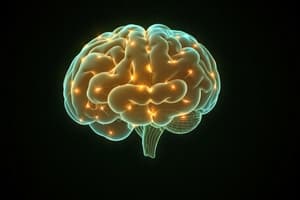Podcast
Questions and Answers
What is the primary focus of cognitive psychology?
What is the primary focus of cognitive psychology?
- The scientific study of cognition and mental processes (correct)
- The examination of cultural influences on behavior
- The study of human interactions with one another
- The development of artificial intelligence in machines
Which of the following is NOT considered a subfield of cognitive psychology?
Which of the following is NOT considered a subfield of cognitive psychology?
- Memory
- Attention
- Emotion
- Genetics (correct)
What technique is used in neuroscience to study the brain activities non-invasively?
What technique is used in neuroscience to study the brain activities non-invasively?
- Electroencephalography (correct)
- Invasive electrode implantation
- Magnetoencephalography (correct)
- Surgical methods on brain structures
Why is applied research important in cognitive psychology?
Why is applied research important in cognitive psychology?
Which area has artificial intelligence shown to be most successful?
Which area has artificial intelligence shown to be most successful?
What role do computational models play in cognitive psychology?
What role do computational models play in cognitive psychology?
Which cognitive process does NOT directly depend on the brain?
Which cognitive process does NOT directly depend on the brain?
What is one of the main goals of cognitive psychology as outlined in the class?
What is one of the main goals of cognitive psychology as outlined in the class?
Flashcards are hidden until you start studying
Study Notes
Introduction to Cognitive Psychology
- Cognitive psychology is the scientific study of cognition, encompassing mental processes involved in information acquisition, storage, transformation, and use.
- Key cognitive processes include perception, attention, memory, and thinking.
- Representation in the mind may not accurately reflect reality.
Goals of the Course
- Explore the history and development of cognitive psychology.
- Investigate key questions and concerns of cognitive psychologists.
- Utilize various tools to examine cognitive phenomena.
- Highlight significant findings in the field without comprehensive coverage of every subfield.
Subfields of Cognitive Psychology
- Relevant subfields include:
- Language
- Perception
- Attention
- Memory
- Reasoning
- Problem solving
- Learning
- Judgment
- Decision making
- Emotion
- Knowledge
- Consciousness
- Intelligence
Artificial Intelligence
- AI refers to machines capable of performing tasks typically requiring human intelligence.
- Success in AI is noted in:
- Complex mathematics
- Rapid large calculations
- Learning capabilities of AI include:
- Computer vision
- Speech recognition
- Self-driving technology
Methods of Studying Cognition
- Neuroscience focuses on studying brain activity through:
- Non-invasive techniques for measuring activity in small brain regions.
- Invasive techniques to measure individual neurons.
- Multiple methods must be integrated for a comprehensive understanding of cognitive processes.
Cognitive Psychology Approaches
- Research is conducted through experimentation to understand human behavior.
- Investigating cognitive processes is tied to brain function, probing common mechanisms.
Computational Modeling
- Involves simulating brain processes via computers, including:
- Machine learning
- Artificial neural networks
- Basic brain functions modeled by computers can enhance understanding of cognitive mechanics.
Importance of Studying Cognitive Psychology
- Basic research is curiosity-driven, targeting comprehension of the world and advancing knowledge.
- Applied research is solution-focused, aiming to develop resolutions for existing problems.
Course Reminders
- Syllabus quiz deadline: Friday, 8/30, by 5:00 PM.
- Ensure access to Top Hat for course engagement.
- Upcoming lab session scheduled.
- No lecture on Monday, 9/2.
Studying That Suits You
Use AI to generate personalized quizzes and flashcards to suit your learning preferences.



